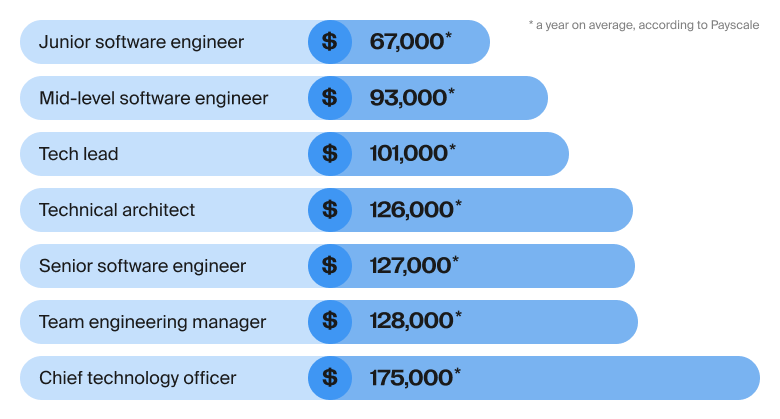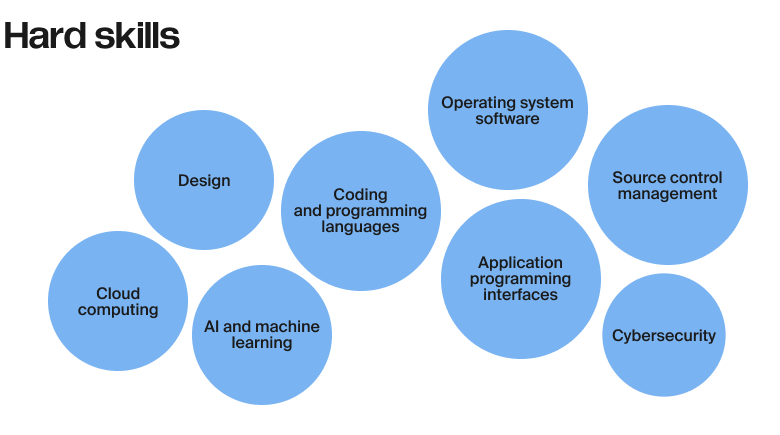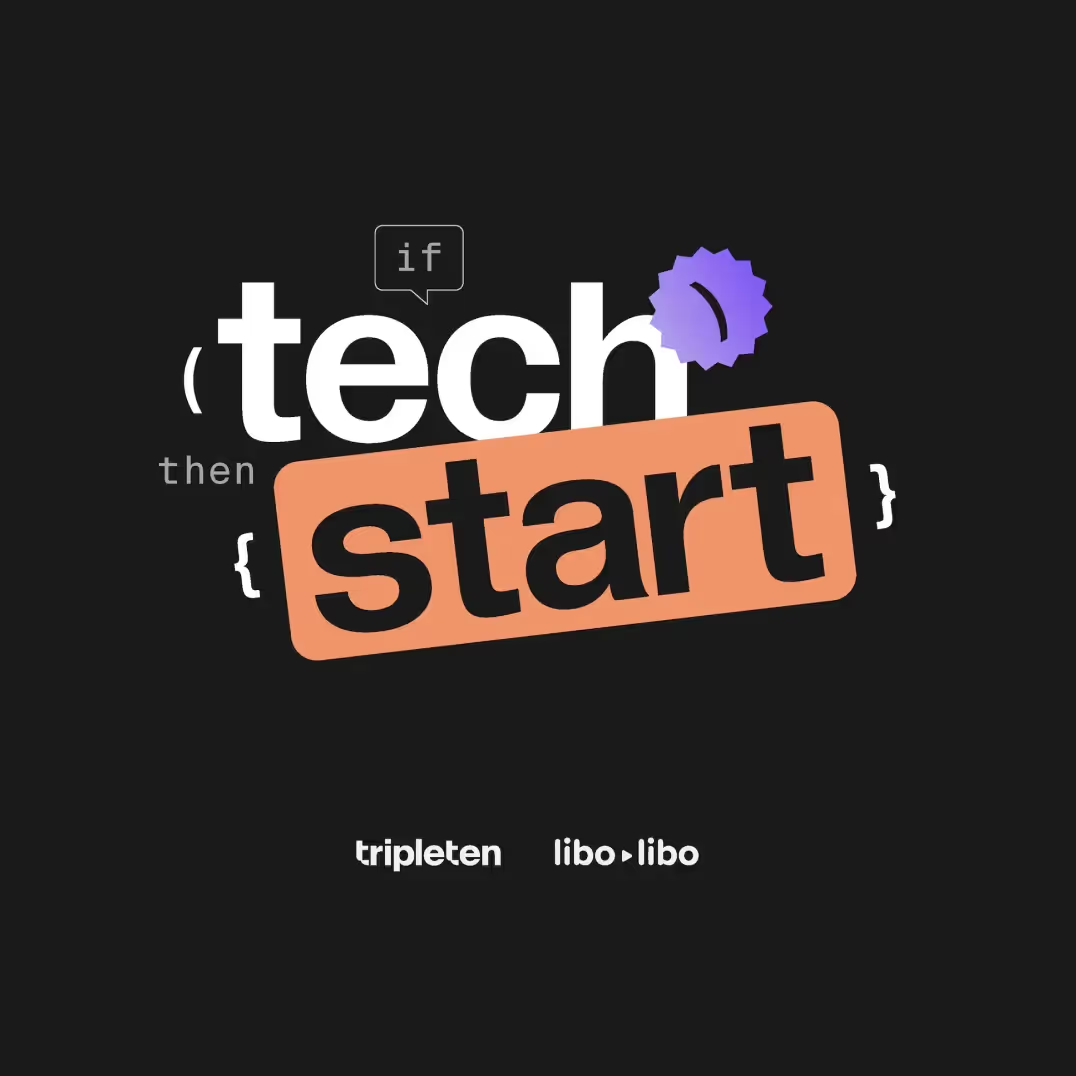The career path of a software engineer can be both rewarding and lucrative. While working on some of today’s biggest tech innovations and solutions, software engineers make on average $133,000 a year, according to the most recent data from the U.S. Bureau of Labor Statistics.
If this field sounds exciting to you, dive in. Here, we break down everything you need to know — from the traditional software engineer career path to the hard and soft skills you’ll need to do the job.
What does a software engineer do?
The main three types of software engineers are:
- Front-end engineers: Front-end engineers focus on what’s visible to users: the user interface (UI) or user experience (UX). For example, the homepage of your most-used app or the shopping cart of your favorite retail store.
- Back-end engineers: Back-end engineers code everything invisible to a user’s eye that helps an application, webpage, or tool run smoothly.
- Full-stack engineers: Full-stack engineers have both front-end and back-end coding skills, which makes them highly versatile — and highly sought after.
Beyond these categories, there are software engineering jobs that specialize in anything from mobile devices (think: apps on iPhone or Android) to the cloud to quality assurance.

What education or experience is required to be a software engineer?
Generally, software engineers have a background in computer science, either through a bachelor’s degree or higher education, or specialized training through an online course or coding bootcamp. It may not be an easy skill set to pick up right away, but anyone with the right dedication can become a software developer.
One misconception is that software engineers have highly refined math skills. In fact, many compare the work of a software developer to that of a composer. In other words, the job requires less mathematical knowledge and more creativity and logic, among other key soft skills such as problem solving and time management (more on that below).
What is a typical software engineering career path?
Here’s what a software engineer career path typically looks like from entry-level to executive, as well as what each role entails and pays on average:

1. Junior software engineer
Salary: $67,000 a year on average, according to Payscale
Junior software engineers are the beginning of the career ladder — if you’re fresh out of college or a bootcamp, this is the role for you.
As a junior software engineer, you’ll write basic code that’s then reviewed by a more senior engineer. You may also be tasked with fixing bugs, documenting processes, attending meetings, shadowing more experienced developers, or collecting user feedback on new software.
2. Mid-level software engineer
Salary: $93,000 a year on average, according to Payscale
A mid-level software engineer has a few years of coding and working on an engineering team under their belt. They also make up the majority of engineering teams because of how many developers fall under this category.
They might have less oversight from managers when coding, or be trusted with more complex problems. They might even mentor or oversee the work of more junior engineers.
3. Senior software engineer
Salary: $127,000 a year on average, according to Payscale
As a senior software engineer, you not only tend to hit the six-figure salary mark, but also likely have reached the first tier of engineer manager. You’re likely managing or overseeing the work of several junior or mid-level engineers to ensure top quality code. Alternatively, if you prefer to be an individual contributor, you’ll be tasked with tackling some of the most crucial coding issues and be seen as the go-to person for questions or ideas.
4. Tech lead
Salary: $101,000 a year on average, according to Payscale
Tech leads are responsible for managing a select portion of an engineering team, either by location or niche. They will get involved in coding, brainstorming, and debugging as necessary, but they are mostly focused on people management, which includes hiring and promoting talent, organizing and delegating tasks, and creating and tracking goals, deadlines, and key performance indicators (KPIs). If you’re looking to step away from the more technical work of engineering, this could be a great pathway to consider — but you’ll need at least five or so years of experience to reach this level.
5. Team engineering manager
Salary: $128,000 a year on average, according to Payscale
Much like a tech lead, engineering managers — or team or group managers — lead their teams in product development, focusing not just on the nitty gritty but the bigger picture. They ensure the team has the tools, support, budget, and organization needed to deliver products on time, and collaborate with other teams, be it product management, design, or senior leadership, to align on expectations.
6. Technical architect
Salary: $126,000 a year on average, according to Payscale
Technical architects, or IT systems architects, design and maintain the systems that engineers build. They do this with the end user (the client or customer) in mind. They partner closely with all levels of engineers, and often specialize in a specific language or area of software development. If you really enjoy one specific aspect of engineering, this could be a position to shoot for.
7. Chief technology officer
Salary: $175,000 a year on average, according to Payscale
Chief technology officers (CTOs) are the end of the line for most software engineers. They oversee the entire engineering department and act as spokespeople to the CEO and major clients. They’re also the guiding force behind new software developments or pivots in technology, as well as the main decider of budgets, hiring, promotions, and team-wide goals. At this level, you’re rarely actually coding or part of the everyday work of software development, but focused instead on the ideation stage and end result.
While becoming a CTO is no small feat, a developer can hit this level sooner than others if they join a burgeoning startup or smaller engineering team.
Is it worth considering a freelance or contract software engineer role?
Instead of signing up for a full-time role in tech, you might want to consider freelancing or doing contract work as a software engineer. By working for yourself — or under your own LLC or business — you gain benefits such as:
- A flexible, remote schedule: Rather than logging on from 9 to 5 (or 8 to 6, more likely), you can work when you want, from wherever you want.
- High income potential: Because you often get to set your own rates as a contractor and work as many or as few hours as you want, you have the potential to earn significantly more money than you would in a traditional full-time job.
- Work you’re excited about: As a freelancer, you pick the companies you work with and projects you work on. If you’re no longer enjoying the work you’re doing, you can decide to “fire” or leave a client. Your days can vary, and the work can be incredibly diverse and continuously challenging.
That said, freelancing isn’t for everyone. It requires a strong work ethic, good organization and time management, a self-starter attitude, and a passion for networking, outreach, and personal branding. After all, you have to sell yourself to clients to get them to want to work with you (and pay your desired rates). Other risks or downsides to consider are:
- Inconsistent pay and work: Freelance work can come in waves as companies cut or expand their budgets or launch or sunset projects throughout the year, meaning you may make a lot of money one month but barely anything another. Companies also have varied payment schedules — most fulfill invoices within 30 days, but others might take longer. Basically, you won’t get that steady paycheck every two weeks like you would in a full-time job.
- Issues with work-life balance: The flipside of a flexible schedule is a schedule where you’re online all the time. Many freelancers fall into this trap. They never say no or take on too many assignments and find themselves working more than they would in a traditional job, leading to them sacrificing time with friends or family, or on outside hobbies. The best way to avoid this is to set boundaries for yourself and the kind of work or income you want.
- Lack of mentorship or career growth: You’re your own boss, which can be fulfilling for some but tiresome for others — not just because you have to do everything yourself, but also because you don’t get as much attention and guidance as you would working under a manager or team. Many freelancers combat this issue by joining freelancing or coworking groups and connecting with other freelance engineers in their free time.
What are the responsibilities of a software engineer?
What you do as a software engineer depends heavily on the kind of team and organization you work for. For example, a software engineer at a large ecommerce company will likely have a very different day-to-day schedule than a developer at a small AI startup.
- Writing code: This is likely where a software engineer will spend most of their time — using programming languages to build software applications from the ground up. Coding is done in sprints, where engineers deliver a project within a two- or three-week timeframe.
- Testing code: Once code is written, software engineers need to then try it out and debug it to ensure no hiccups arise when it’s deployed to clients, customers, or internal staffers. They may also participate in larger code reviews.
- Documenting code: Engineers often document how they wrote certain code or guidelines around their process to streamline future production, as well as ensure any updates are held to the same standards and fit seamlessly into current code.
- Attending meetings: These may include meetings with product managers or other developers to ideate or brainstorm revisions around software, or sessions with senior leadership or clients discussing the latest updates or deployments.
- Managing other engineers: As you move up the career ladder, you may be in charge of mentoring and overseeing more junior engineers or a team of specialists. Not only will you have to ensure they’re completing their work correctly and on time, but you’ll also have to pave their career paths within the organization through training, feedback sessions, and regular performance reviews.
- Research and education: Tech is rapidly evolving, which means software engineers need to set aside time to stay updated on the latest tools and trends in their industry. This might involve reading reputable research or publications, attending conferences or networking events, or taking a class or bootcamp.
While a lot of the job requires working solo, as noted above, you may be tasked with collaborating with others from time to time, either through an agile or scrum team or through open source development.
What are relevant software engineering skills?
There are a lot of routes you can take to start your career in software engineering. Below, we cover the most common hard and soft skills needed to land — and succeed in — the job.
Hard skills
Software engineers typically have these hard skills necessary to build tools, apps, and webpages:

- Coding and programming languages: Depending on what they’re building and whom they’re building it for, software engineers need to be well versed in languages such as HTML, CSS, JavaScript, Ruby, Python, C, C++, and SQL, among others.
- Application programming interfaces (APIs): APIs provide a way for two or more programs to communicate, and are common for developers looking to scale and automate tasks.
- Operating system software: A deep understanding of operating systems allows you to not only learn from other successful platforms but also build software specifically for them.
- Source control management (SCM): SCM, or a version control system (VCS), is the process of tracking changes to code. Git is one of the more popular tools in this realm.
- Cloud computing: Software deployed in the cloud is often cheaper, more efficient, and more versatile. Familiarity in AWS, Google Cloud, and/or other cloud platforms is a plus for software engineers.
- Cybersecurity: Even if you don’t work for a cybersecurity company, having some expertise in this area helps protect the apps and tools you’re building from cyberthreats.
- AI and machine learning: Engineers are realizing they need to take advantage of this powerful technology to make software development more efficient and effective.
- Design: Developers specifically focused on UX/UI might also benefit from knowing how to use design tools such as Adobe, InVision, and Figma.
Soft skills
You can’t get a job in software engineering without some technical knowledge, as listed above. However, to really thrive, you’ll also want to refine the following soft skills:

- Time management: When you manage your time well, you’re able to deliver software your clients depend on to run their lives or businesses quickly and when they need it most.
- Organization: Software engineers should be able to properly organize the many tasks in front of them as well as help project manage for the rest of the team should issues arise or priorities change last minute.
- Critical thinking and problem solving: To find a bug in code or create software that meets a customer need, you’ll need a critical mind and lens for the bigger picture.
- Strong communication and emotional intelligence: Web development is a collaborative and team effort. Being able to communicate your ideas in a way that everyone understands them and work well with others is paramount.
- Patience and adaptability: Because technology is a moving target, you’ll have to have the patience and penchant for change and new approaches.
How do you start a career in software engineering?
Even better, many programs offer hands-on training, opportunities to collaborate with other students, flexible and self-paced schedules, and career services such as resume or interview support and job placement at major tech companies.
But if you prefer a longer-term learning experience, a full- or part-time college or graduate program focused on engineering or computer science may be the move.
How do you advance your software engineering career?
Continued education and exposure is the best way to advance as a software engineer. The more coding you do and the more complex and diverse problems you take on, the better prepared you’ll be as you move up the ladder and into different industries. If your current role doesn’t allow you to expand your workload or interact with an array of experts, you might want to consider opportunities outside your organization, be it engineering events and panels, open source projects on GitHub, or online courses.
TripleTen’s Software Engineering Bootcamp is perfect for software engineering beginners and career changers. The eight-month program features a robust overview of key software engineering skills, languages, and tools, an externship to work on a project for a real-life company, and one-on-one career coaching for when you’re ready to job search. Almost 90% of TripleTen’s graduates land a job within six months.
%20(1).avif)


.avif)
.avif)











.avif)


